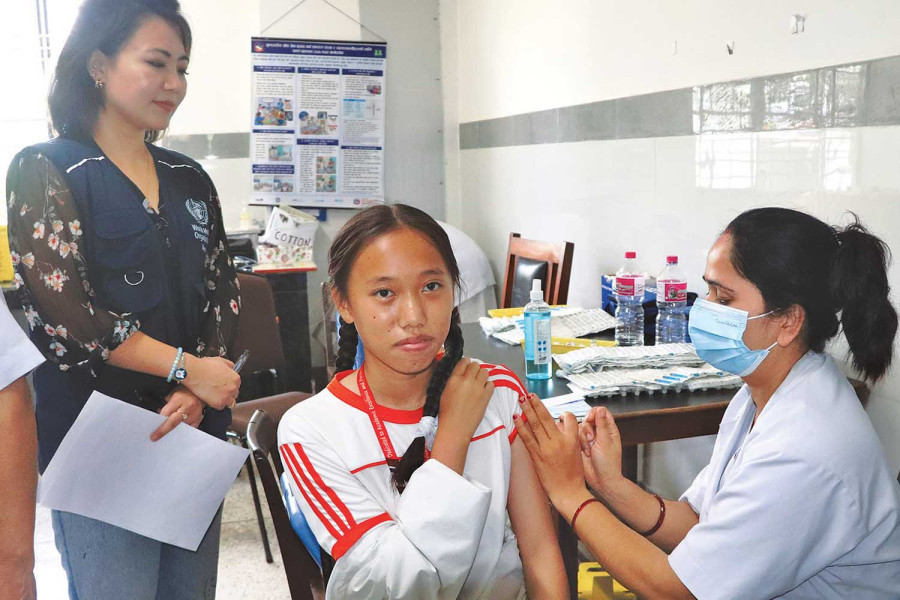Health
Nepal starts providing second dose of HPV vaccine
Plan is to jab around 1.7 million girls between 10 and 14 years. Over 9,900 girls were vaccinated last year.
Post Report
The Ministry of Health and Population has started administering the second dose of the human papillomavirus (HPV) vaccine to girls who got the first dose in September last year.
The vaccine doses are being administered to only those, who took the first dose of vaccine in September last year.
According to the data provided by the Health Ministry, 9,980 girls between 14 and 15 years old from all seven provinces were jabbed with the first dose of HPV vaccine under the demonstration programme.
Dr Abhiyan Gautam, chief of the Immunisation Section of the Family Welfare Division under the Department of Health Services, said that the inoculation of the second dose of HPV vaccine has started on Tuesday in Lumbini Province, Wednesday in Koshi, Gandaki, Madhesh and Karnali Province and on Thursday in Bagmati Province.
Sudurpaschim Province will start the vaccine administration from next Thursday only. Health officials said that the vaccine doses will be administered from the same places where the first dose was available.
“As many schools throughout the country have been holding final examinations, uptake of the vaccine could be delayed,” said Gautam. “But the health agencies concerned are aware of it and have prepared accordingly.”
Human papillomavirus is a viral infection that spreads through skin contact. The virus causes cervical cancer, which is the second-most common cancer in the developing world and a major cause of death among Nepali women. Hundreds of women get diagnosed with cervical cancer every year in Nepal.
According to the BP Koirala Memorial Cancer Hospital in Bharatpur, more than 700 women suffering from cervical cancer seek treatment at the hospital every year.
HPV vaccination was also mentioned in the government’s policies and programmes for the fiscal year 2023-24.
Doctors say most cervical cancer cases are associated with the HPV, a sexually transmitted infection and that widespread immunisation could reduce the impact of cervical cancer and other cancers caused by the HPV worldwide.
Countries like Bhutan, Sri Lanka, Thailand and the Maldives have introduced the HPV vaccine nationally while India and Indonesia have introduced it in some districts.
In 2016, Nepal piloted HPV vaccination in Chitwan and Kaski districts. All girls aged 11 to 13 years were then given two doses of the vaccine.
Experts say early treatment prevents up to 80 percent of cervical cancer.
Meanwhile, health ministry officials said that a nationwide HPV vaccination drive is likely in the third quarter of 2024. The ministry plans to inoculate around 1.7 million girls between 10 and 14 years with HPV vaccine during the ongoing nationwide drive, and also make it a part of regular immunisation.
According to officials, the Global Alliance for Vaccine and Immunisation (GAVI) has agreed to provide HPV vaccine doses. They said that once the campaign is completed, the HPV vaccine will be included in the government’s routine immunisation programme.
Nepal had submitted a proposal to GAVI in July last year requesting it for HPV doses for free so that the vaccine could be included on the regular immunisation list. Health Ministry officials say that they have proposed a budget for a nationwide HPV vaccination campaign in 2024.
“We are waiting for an assurance letter for vaccine doses from GAVI,” said Dr Bibek Kumar Lal, director at the Family Welfare Division. “We have been expecting the letter within next week, which is also required to get the budget approved.”
Officials say that GAVI has already agreed to provide required doses of vaccine, but the problem is availability of vaccine doses.
The World Health Organisation says HPV vaccination is recommended as part of a coordinated strategy to prevent cervical cancer and other diseases caused by the virus.
The UN health body says HPV is responsible for more than 70 percent of the cervical cancer cases in women. Countries that have included the HPV vaccine in their regular immunisation list have successfully reduced cervical cancer cases in women, according to doctors.




 14.12°C Kathmandu
14.12°C Kathmandu














